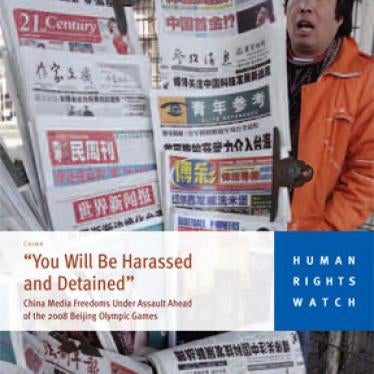The Honorable Michael R. Bloomberg
Mayor
City Hall
New York, NY 10007
Dear Mayor Bloomberg,
Human Rights Watch writes to you regarding your upcoming trip to China next week. We are encouraged by your statement in a press conference that if you did not raise your concerns about press freedoms and human rights, you would be derelict in your duty as mayor. However, it is important that you also speak publicly about these issues, as experience has shown only public pressure brings results in China.
China has an abysmal record on human rights. One key area we hope you will raise with the Chinese authorities and in your public statements is restrictions on freedom of the media. Your own career in media, business and politics would not have been possible without a free media. You have a unique opportunity to explain to the Chinese government how important media freedom is to the social, economic, and political development of any country.
The Chinese government made specific pledges on media freedom when bidding to hold the 2008 Olympic Games. On January 1, 2007, the government introduced temporary regulations to give expanded freedoms to accredited foreign journalists in the run-up to, and during, the 2008 Olympic Games in Beijing. Despite the existence of these regulations, Human Rights Watch research has documented continuing harassment, intimidation and detention of foreign journalists in China. Such violations raise serious questions about the Chinese government’s sincerity in committing to honor its obligations to the International Olympic Committee.
Domestic reporters fare even worse, since the regulations do not apply to them. They are subject to arrests, long prison sentences and strict censorship if they do not comply with official directives.
We urge you to publicly as well as privately take up this issue with Chinese officials and recommend that the Chinese government:
- Enforce the new temporary regulations for foreign journalists’ reporting rights so that they do not face harassment, intimidation, or detention;
- Extend the same rights to Chinese journalists, in line with article 35 of China’s constitution (“Citizens of the People's Republic of China enjoy freedom of speech, of the press, of assembly, of association, of procession and of demonstration”) and article 19 of International Covenant on Civil and Political Rights (“Everyone shall have the right to freedom of expression [including] freedom to seek, receive and impart information and ideas of all kinds, regardless of frontiers, either orally, in writing or in print, in the form of art, or through any other media of his choice”);
- Make the “temporary” regulations a permanent component of Chinese law.
Human Rights Watch has researched and documented many other human rights violations in China including concerns about the rule of law and legal reform, freedom of religion, labor rights, media and internet censorship, forced evictions of people from their homes, and assaults on petitioners (Chinese citizens from rural areas travelling to Beijing regarding complaints about mistreatment by local officials).
We believe you have a number of opportunities to raise human rights issues, especially press freedom, in your upcoming visit. One prime opportunity would be your speaking engagement at a conference in Beijing on December 10, which happens to be International Human Rights Day.
Please find attached Human Right Watch’s reports on media censorship and the harassment of petitioners in China. Further information on these and other human rights abuses in China, in the context of the 2008 Summer Games, is available on our regularly updated Beijing Olympics website.
We would also be pleased to meet with you and members of your delegation after your visit, to further discuss ways the City of New York could not only consolidate its important business ties with Beijing, but also work towards rights reforms that will benefit all citizens of China.
Thank you in advance for your consideration.
Sincerely,
Kenneth Roth
Executive Director







